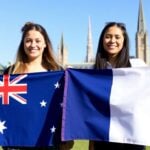Deadline: 30 October 2024
The American Council of Learned Societies (ACLS) is seeking applications for Mellon/ACLS Dissertation Innovation Fellowships, which provide a year of support for doctoral students preparing to embark on innovative dissertation research projects in the humanities and interpretive social sciences.
Mellon/ACLS Dissertation Innovation Fellowships support graduate students who show promise of leading their fields in important new directions. The fellowships are designed to intervene at the formative stage of dissertation development, before research and writing are advanced. The program seeks to expand the range of research methodologies, formats, and areas of inquiry traditionally considered suitable for the dissertation, with a particular focus on supporting scholars who can build a more diverse, inclusive, and equitable academy. This program is made possible by a grant from the Mellon Foundation.
The program supports projects that push the traditional approaches and forms of dissertation research in new directions. The strongest applications will show evidence of thoughtful plans for engaging the sources, resources, scholars, and communities – on campus and/or off – necessary to advance their projects. Fellows might design a fellowship year that includes:
- directed interdisciplinary research and methodological training that pushes beyond the scope of their field’s norms with faculty within and/or outside their home institutions;
- exploration of new modes of scholarly communication and dissertation design;
- intensive digital methods training and research;
- equitable collaboration with community partners;
- a short-term practicum with a non-academic organization (such as a cultural, policy, or social justice organization) to develop experience with applied methods, site-based research involving community-engaged or collaborative approaches.
Funding Information
- Award: $42,000 base stipend for the fellowship year, plus up to $8,000 for project-related research, training, development, and travel costs. The award also provides a separate $2,000 stipend for external mentorship.
- Tenure: one year beginning between July 1 and September 1, 2025.
Eligibility Criteria
- The basic eligibility criteria for applicants are outlined below. As opposed to fellowship programs that support dissertations where writing and research is well underway, advanced, or nearing completion, this program intends to intervene at the formative stages of project development. Therefore, projects that are already well underway will not be as competitive in this process. Given the variation in graduate student trajectories, and the wide range of curricular requirements across departments and schools, this program’s eligibility window covers a varying and flexible period in the middle of doctoral study. Some applicants may be applying in the year immediately before achieving candidacy/ABD status, or the year they achieve candidacy, to support the first stretch of work as a PhD candidate; others may seek to expand their field/methodological horizons at a relatively earlier stage of their graduate studies. As described in the criteria below, the program requires applicants to have completed all required coursework in their doctoral curriculum by the time the fellowship commences. Individuals must be enrolled full-time and may not accept teaching or research assistantships, other major fellowships, internships, or similar internal or external awards during fellowship tenure.
- Applicants must:
- Be a PhD student in a humanities or social science department in the United States.
- Be able to take up a full year (9-12 months) of sustained specialized research and training, released from normal coursework, assistantships, and all teaching responsibilities.
- Have completed at least two years and all required coursework in the PhD programs in which they are currently enrolled by the start of the fellowship term.
- Have not advanced to PhD candidacy/ABD status prior to January 1, 2024.
- Have not previously applied for this fellowship more than once.
- The Mellon/ACLS Dissertation Innovation Fellowship program does not accept applications from students receiving professional or applied PhDs, terminal degrees that are not a PhD (such as an EdD or MFA), or PhDs outside of humanities and interpretive social science departments, including the following disciplines: business, clinical or counseling psychology, creative or performing arts, education, engineering, filmmaking, law, library and information sciences, life/physical sciences, public administration, public health or medicine, public policy, social work, or social welfare.
Evaluation Criteria
- Reviewers in this program are asked to evaluate all eligible proposals on the following criteria:
- The potential of the project to advance the field(s) of study in which it is proposed and make an original and significant contribution to knowledge.
- The potential of the project to challenge scholarly convention and/or expand the prevailing norms of what constitutes important scholarship through its innovative format or formats, its novel methodology, subject matter, or theoretical framework, or its meaningful engagement with an interdisciplinary and/or community partner. ACLS seeks applicants who have a strong grasp of the existing norms and trends in their primary discipline of study, and who have taken advantage of the opportunities available in their department and campus to advance their training and scholarly projects.
- The feasibility of the proposed project and the likelihood that the applicant will execute the work within the proposed time frame (during and after the fellowship term).
- Fulfillment of one or more of the following factors:
- The project’s thoughtful engagement with communities that are historically underrepresented in higher education and the potential for this experience to shape research.
- Scholarly and/or pedagogical practice that is responsive to the interests and histories of people of color and other historically marginalized communities, including (but not limited to) Black/African American, Hispanic/Latinx, and Indigenous communities from around the world; people with disabilities; queer, trans, and gender nonconforming people; and people of diverse socioeconomic backgrounds.
For more information, visit ACLS.


























